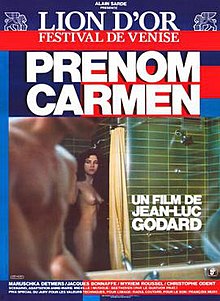fiction.wikisort.org - Movie
First Name: Carmen (French: Prénom Carmen) is a 1983 French film directed by Jean-Luc Godard. Based very loosely on Bizet's opera Carmen, the film was written by Anne-Marie Miéville and produced by Alain Sarde, and stars Maruschka Detmers and Jacques Bonnaffé. The film won the Golden Lion at the 1983 Venice Film Festival and had 395,462 admissions in France.[1]
This article needs additional citations for verification. (December 2016) |
| First Name: Carmen | |
|---|---|
 Promotional release poster | |
| Directed by | Jean-Luc Godard |
| Written by | Anne-Marie Miéville |
| Produced by | Alain Sarde |
| Starring | Maruschka Detmers Jacques Bonnaffé |
| Distributed by | Parafrance |
Release dates | September 1983 (VFF) 11 January 1984 (France) 3 August 1984 (New York City) |
Running time | 85 minutes |
| Country | France |
| Language | French |
| Box office | $3 million[1] |
Plot
This section does not cite any sources. (August 2022) |
Carmen, in a voice over paired with shots of the city and the sea, introduces herself as "the girl who should not be called Carmen." Somewhere a string quartet is rehearsing the late string quartets of Beethoven. The eccentric Jeannot (played by Godard himself) is living in a sanitarium where the doctor threatens to throw him out if he doesn't start to show signs of real illness. Carmen comes to visit him, and it is revealed he is a washed up filmmaker and her lecherous uncle. After getting her Uncle Jeannot to loan her his seaside apartment, Carmen and some others attempt to rob a bank.
During the mayhem of the robbery, Carmen comes face to face with Joseph, a comically inept bank guard, and the two immediately fall in love. The string quartet continues to rehearse, inflecting the scenes of the robbery, and vice versa. The narrative link is that one of the members of the quartet is Claire, who is established earlier in the film as a potential love interest for Joseph.
Carmen and Joseph retreat to Uncle Jeannot's apartment, where Carmen recalls childhood incestuous encounters. Carmen tells Joseph, quoting from Carmen Jones, "if I love you, that's the end of you." Joseph is arrested and put on trial, while Carmen escapes with Fred, the leader of her gang. In flashback, Carmen reveals to Joseph that the robbery was intended to fund a larger project, the kidnapping of "a big manufacturer," or his daughter, with a fake film directed by Uncle Jeannot meant to provide cover, a scheme that John Dillinger supposedly once perpetrated. Joseph is acquitted with the help of an impassioned public defender and Claire's moral support.
Meanwhile, Fred persuades Uncle Jeannot to direct the gang's film. After receiving a rose from her during the trial, Joseph reunites with Carmen at a hotel where the gang is staying. He plans to renew their relationship and to participate in the kidnapping, but Carmen seems increasingly uninterested in him and the gang ostracizes Joseph. Things go from bad to worse for Joseph as Carmen toys with a young hotel attendant, Fred directs Carmen to tell Joseph it's over, and Joseph forces Carmen into an abject sexual encounter in the shower where he masturbates on her.
The day of the kidnapping arrives, and is to take place in the restaurant in the hotel where the gang has been staying. Uncle Jeannot is present to direct the film (apparently shot on video), along with the string quartet (performing in public at last) and eventually the police (who have followed Joseph). As with the bank robbery, mayhem ensues.
Joseph is determined to face off with Carmen alone; a gun goes off between them, and Carmen falls to the floor. Leaving her for dead, the police drag Joseph away. In a stupor, Carmen asks the young hotel attendant what it is called when the innocents are on one side and the guilty on the other, when everything has been lost but you are still breathing and the sun is still rising. "Daybreak," he responds.
Cast
- Maruschka Detmers as Carmen X
- Jacques Bonnaffé as Joseph Bonnaffé
- Myriem Roussel as Claire
- Hippolyte Girardot as Fred
Prénom Carmen was originally intended to star Isabelle Adjani in the title role. Adjani, who had achieved international fame in François Truffaut’s The Story of Adele H. (1975), left the set after a week of filming, finding Godard’s alienating approach to actors traumatic.
It was Alain Sarde who brought a twenty-year-old Dutch girl, Maruschka Detmers, to the attention of Jean-Luc Godard, just out of an acting class and without any film experience behind her. Godard accepts, persuaded both by the perfectly fitting physical type to give life to a sensual and melancholy Carmen, and by the ease with which she faces, during an audition, a nude scene in the presence of the male protagonist.[2]
References
- "Prénom Carmen (1984)". JPBox-Office. Retrieved 5 December 2016.
- Jean-Luc Godard, p. 205, at Google Books
External links
- First Name: Carmen at IMDb
На других языках
- [en] First Name: Carmen
[ru] Имя: Кармен
«Имя: Кармен» (фр. Prenom Carmen) — кинофильм режиссёра Жана-Люка Годара, вышедший на экраны в 1983 году. Фильм награждён двумя призами Венецианского кинофестиваля.Другой контент может иметь иную лицензию. Перед использованием материалов сайта WikiSort.org внимательно изучите правила лицензирования конкретных элементов наполнения сайта.
WikiSort.org - проект по пересортировке и дополнению контента Википедии